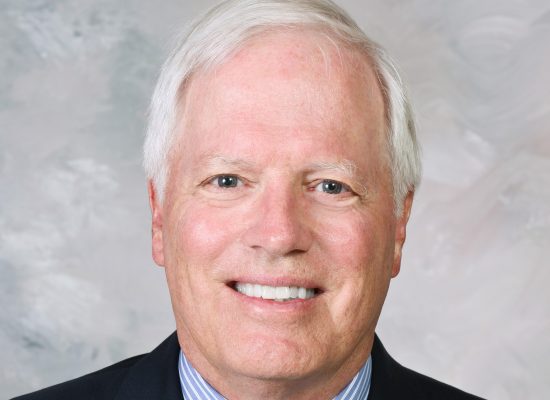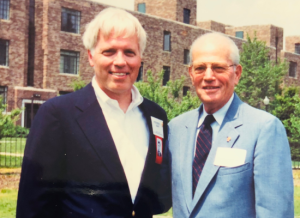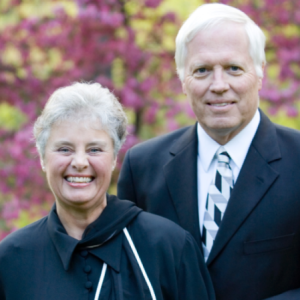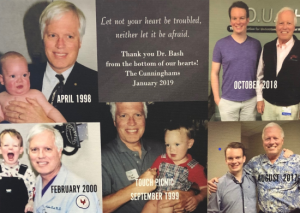Meet Dr. Stephen Bash, Our Medical Advisory Board Chair

“The help DSCC provides is more important now than it’s ever been.”
Division of Specialized Care for Children (DSCC) Medical Advisory Board Chair Dr. Stephen Bash is a “Hoosier” born and raised.
He attended college and medical school at Indiana University. While doing his rotation at Riley Children’s Hospital in Indianapolis, he fell in love with pediatric cardiology.
“I had completed one year of training, but it takes two years to be board certified for pediatric cardiology,” Bash explained. “I had to make a decision to either continue my training or join my dad at his practice.”

He joined the practice and got hands-on experience treating children with many kinds of complex healthcare needs.
Bash was partially trained and was one of only three pediatric cardiologists in the state of Indiana. For 11 years, he referred his patients, who came from multiple states, to the two specialists he had trained with at Riley Children’s Hospital.
Bash was 40 years old when his dad started to retire.
“So, I figured it was time for a new wife, a Porsche or to go back into a training program,” Bash joked. “I kept my wife, never got a Porsche and completed my training to become a board-certified pediatric cardiologist. Most people do it the other way around, but I completed my academic training after being in private practice for more than a decade as a pediatrician.”
Bash, his wife, Patti, and their four children moved to Houston so that he could finish his fellowship requirements and complete an extra year of heart catheterizations at Texas Children’s Hospital.
Where’s Peoria?
At age 42, Bash was in the job market and fielding offers. Dr. William Albers at OSF Saint Francis Medical Center invited him to Peoria.
“I was invited to visit numerous places around the country. We had Peoria at the bottom of the list,” Bash said. “Patti and I decided we would keep an open mind, look around and talk to people before making our decision. “
The Bashes toured Peoria and found there was a lot to like. He joined OSF Saint Francis Medical Center, where he helped start the Congenital Heart Clinic and connected with DSCC.
“I initially started with DSCC evaluating and accrediting congenital heart program centers in Illinois,” said Bash. “I quickly realized that these centers of excellence were only one piece and began to connect with the other subspecialists in the state.”
It was Dr. Bash who had the dream of starting the Children’s Hospital of Illinois. The hospital eventually grew from 15 pediatric subspecialists in 1985, when he joined the pediatric cardiology group, to 150 pediatric subspecialists. It also underwent a $283 million project that included building a new facility.
In 1986, as Peoria was taking on this project to grow The Children’s Hospital of Illinois, Dr. Albers stepped down from chairing DSCC’s Medical Advisory Board (MAB). He asked Bash if he would like to join the board.
Bash accepted and has been serving in many ways since.
“I will continue to help”
The MAB is a diverse group of healthcare professionals. Each offers a unique perspective on how DSCC can enhance our care coordination services for children with special healthcare needs.
“Over the years I’ve worked with all kinds of subspecialists. I’ve also seen what the families have to go through,” explained Bash. “DSCC’s (program) is the only one that coordinates care statewide and helps steer these families through a confusing maze of insurance changes, seeing all kinds of specialists and understanding their treatment options. The help DSCC provides is more important now than it’s ever been.”
Knowing the many challenges medically complex children and their families face, Bash has focused on breaking down silos and building lasting connections to improve care.
“I began connecting with other doctors and providers in the state. Just like DSCC covers the entire state, Peoria’s pediatric cardiology clinic outreach is also wide-ranging,” Bash said.
“Even if we were competitors, we could still cooperate. For example, OSF could refer transplants to Chicago or St. Louis. Silos don’t work for the families, so creating lasting partnerships to help these families has always been at the forefront.”
Bash said he has always tried to make serving on the board personal because “what you see in a clinic or the hospital isn’t the same as visiting a family in the home.”
“Visiting these families in their homes gave me a much different picture of what they were going through. It was very humbling and not something you will get from your hospital clinic experience. Now, DSCC is there to help these families coordinate care.”
The University of Illinois Board of Trustees appoints DSCC’s Medical Advisory Board members for a three-year term. The MAB membership currently includes pediatric specialists in cardiology, rehabilitation, plastic and reconstructive surgery, neurology and more.
“I am so impressed by our members and all that they do,” Bash emphasized.
“The amazing parent, specialist and staff presentations to the board continue to help us learn about and better understand the different specialties, the many pieces involved in getting and providing care and the ways we can help impact making the services these families need available. We volunteer because we love what we do, and the need is so great.”
Dr. Bash retired from OSF three years ago and continues to enjoy leading the MAB.
“I feel like I’ve lived in the best age of medicine for any physician,” said Bash.
“From the development and mass production of penicillin to the eradication of polio, to the amazing procedures now being done in pediatric cardiology, we’re now doing cardiovascular surgery that I never thought would be possible in such tiny hearts,” he said.
“I’ve had a fabulous career, and DSCC has been an important part of that. There is no question that the needs of these families are very complex. As long as DSCC allows me to, I will continue to help.”
Thank you for your exceptional service, Dr. Bash!
Visit our Medical Advisory Board page to learn more about the MAB and its mission.




